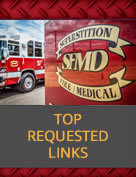Emergency Preparedness
Keep enough supplies in your home to meet your needs for at least three (3) days. Assemble a Disaster Supplies Kit with items you may need in an evacuation. Store these supplies in sturdy, easy-to-carry containers such as backpacks, duffel bags, or covered trash containers.
Include:
- A three-day supply of water (one gallon per person per day) and food that won’t spoil.
- One change of clothing and footwear per person, and one blanket or sleeping bag per person.
- A first aid kit that includes your family’s prescription medications.
- Emergency tools including a battery-powered radio, flashlight, and plenty of extra batteries.
- An extra set of car keys and a credit card, cash, or traveler’s checks.
- Sanitation supplies.
- Special items for infant, elderly, or disabled family members.
- Keep important family documents in a waterproof container. Keep a smaller kit in the trunk of your car.
Emergency Vehicle Kit:
- Battery powered radio, flashlight, and extra batteries
- Blankets
- Booster cables
- Fire extinguisher (5lb. ABC type)
- Bottled water and non-perishable high energy food
- Maps, shovel, flares
- Tire repair kit and pump
If Disaster Strikes…
- Remain calm and patient. Put your plan into action!
- Check For Injuries
- Give first aid and get help for seriously injured people.
- Listen to your battery powered radio for news and instructions
- Evacuate, if advised to do so and invoke your Family Communications Plan. Wear protective clothing and sturdy shoes.
Check for damage in your home…
- Use flashlights – do not light matches or turn on electrical switches, if you suspect damage.
- Check for fire, fire hazards and other household hazards.
- Sniff for gas leaks, starting at the water heater. If you smell gas or suspect a leak, turn off the main gas valve, open windows, and get everyone outside quickly.
- Shut off any other damaged utilities.
- Clean up spilled medicines, bleaches, gasoline and other flammable liquids immediately.
Remember to…
- Confine or secure your pets.
- Call your family contact-do not use the telephone again unless it is a life-threatening emergency.
- Check on your neighbors, especially elderly or disabled persons.
- Make sure you have an adequate water supply in case service is cut off.
- Stay away from downed power lines.






